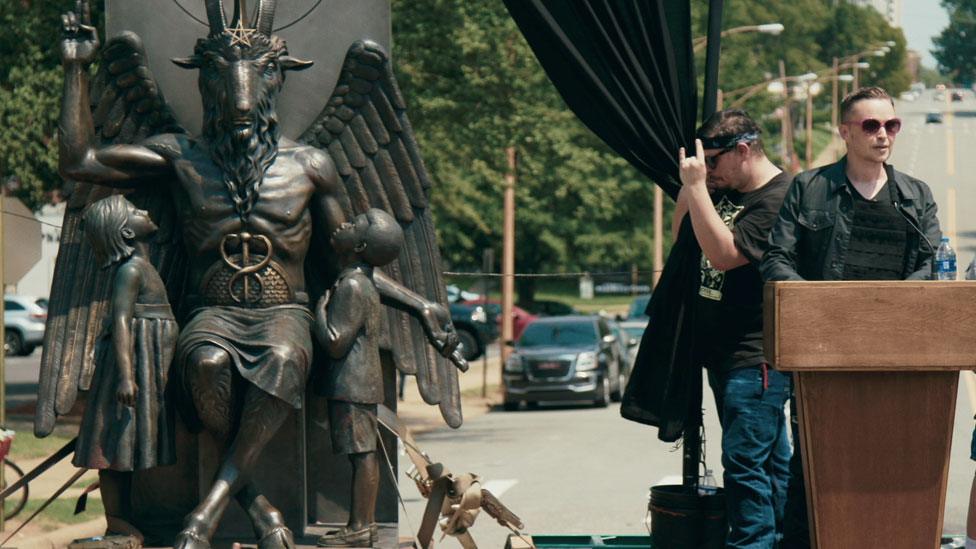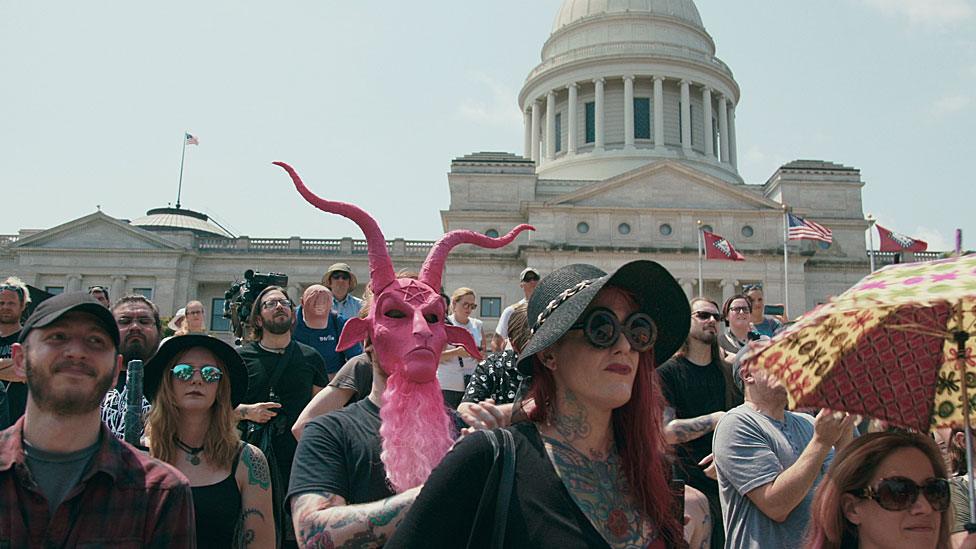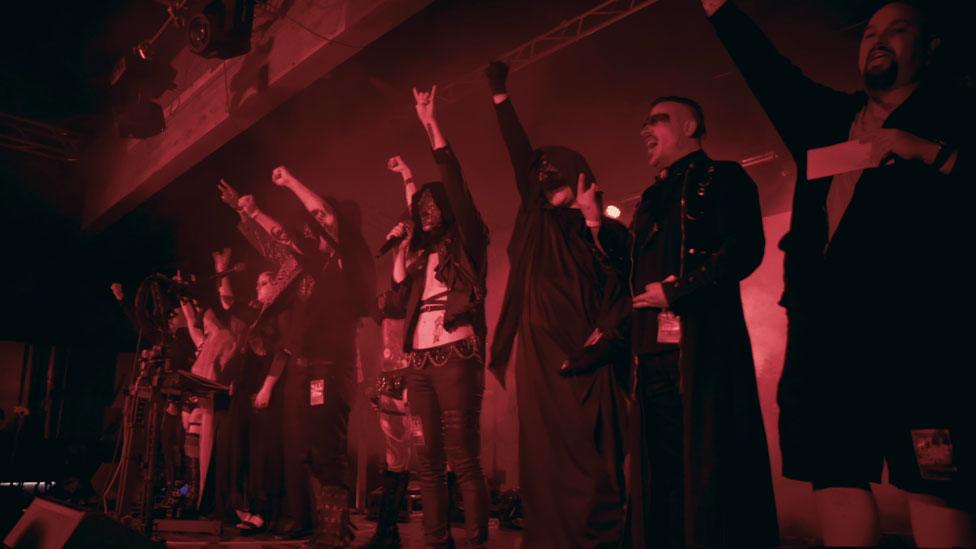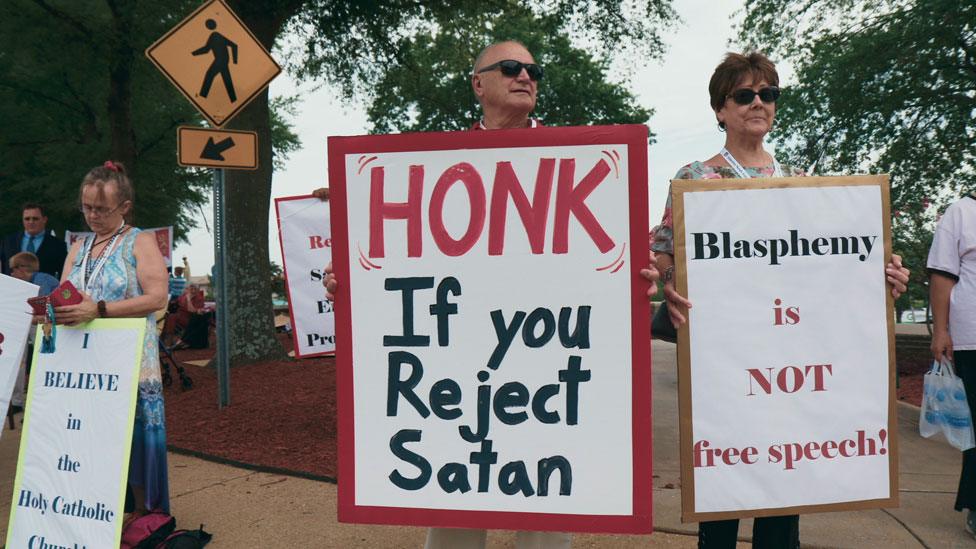Hail Satan?: The Satanists battling for religious freedom
- Published

Lucien Greaves (far-right) uses several aliases to protect his family
Everything you know about Satanism is wrong.
At least that's what a new documentary about the Satanic Temple could be about to prove.
Despite the similarity of the name, the Temple is different to The Church of Satan, established in 1966 by chat show circuit celebrity Anton LaVey in San Francisco, California.
Human sacrifice? Wrong. Blood drinking? Wrong. Black Mass? Well, sort of right.
The Temple was founded in 2013 with a mission statement "to encourage benevolence and empathy among all people, reject tyrannical authority, advocate practical common sense and justice, and be directed by the human conscience to undertake noble pursuits guided by the individual will".
Hail Satan? directed by US film-maker Penny Lane, follows the Temple's attempts to curtail what they see as the encroachment of Christianity on US life through its growing political influence.
That creeping theocracy results in a monument to the Ten Commandments being offered pride of place at the Oklahoma State Capitol building in Oklahoma City.
The Temple's response is to ask for a space for their own statue of the Satanic deity Baphomet in a bid to restore some kind of cosmic religious balance, all the while preaching a doctrine in support of social justice and human rights.
"We want people to evaluate the United States being a Christian nation," the Temple's spokesman Lucien Greaves says in the film's trailer. "It's not".
"I had heard about the Satanic Temple when they were doing their campaign in Oklahoma," says Lane.

The Temple members say they are fighting to keep the US a secular country
"I thought it was a very funny joke from afar, that they were sort of pretending to be Satanists, but I discovered they had at that point 50,000 members.
"The more I looked into it, the more rich and confusing and provocative and interesting it became."
The film follows the eloquent, intelligent Greaves as he and his fellow Satanists encourage people to give blood, collect socks for the homeless, clean public beaches (using small pitchforks - a cute touch) and hold Satanic after-school clubs for children who are taught about the Temple's tenets which include:
One should strive to act with compassion and empathy towards all creatures in accordance with reason.
People are fallible. If we make a mistake, we should do our best to rectify it and resolve any harm that may have been caused.
And although there is a certain theatrical, horror movie side to their Black Mass rituals in which they do invoke Satan, they freely admit none of them actually believe in Satan as an actual spiritual entity, leaning instead on the accurate translation of the Hebrew word Satan, which means "adversary".
"I didn't find it that complicated or that hard to get that they had organised their religion around abstract and essentially fictional concepts," says Lane.
"It is not a gimmick, you know, but it is a kind of acknowledgment that religion is fundamentally about things that are deeply believed, but not provable.

The group holds theatrical Black Masses which take on the form of performance art
"I came to understand that you don't need to literally believe in something to believe that it's important. I think human rights are fundamental, and I would die to protect human rights for other people. But I don't think human rights are some literal thing that exists in the world.
"It doesn't work like that, like all the things that we believe, actually, as human beings are the most important thing, love and rights and freedom and justice, equality. These kinds of things are fair like made up things, they're just ideas."
While the documentary's energies largely focus on the Temple's attempts to have their beautifully sculpted bronze statue of Baphomet (with a torso modelled on Iggy Pop no less) erected on federal grounds, it also touches on the "Satanic Panic" wave of moral panic which swept across America during the 80s and 90s - driven by music, video games - even bizarrely, the Dungeons & Dragons board game.
Far-right Christian organisations and authorities saw examples of Satanism everywhere.
Allow YouTube content?
This article contains content provided by Google YouTube. We ask for your permission before anything is loaded, as they may be using cookies and other technologies. You may want to read Google’s cookie policy, external and privacy policy, external before accepting. To view this content choose ‘accept and continue’.
"It was this 10 to 15-year period, where there was a basic idea that there was a kind of organised, underground, secret conspiracy of Satanists that were kind of running around, doing evil things like murder and torturing animals and raping children and doing it in the name of Satan," explains Lane.
"Many people had their lives ruined and in the most extreme example, went to prison for a very long time.
"If you do any research into it, you would quickly see that there were no Satanists, there was no secret underground. As Lucien says in the film, he learned the real evil was in the witch hunt itself. And it's something that we have to remember as a society that we are capable of doing.
"And there's been no attempt publicly, to come to terms with that period. It's like it just happened. And then it ended, and no one talks about it anymore. And I think the Satanic Temple really does want people to remember and to know more about what happened during that period."
Greaves (not his real name, he goes by several aliases to protect his family) himself receives life threats during the group's campaign and wears a bullet-proof vest to his statue's unveiling.
"It was very clear that he was very concerned about protecting the identity of his family," says Lane. "I don't think that is some kind of nefarious mystery. There's so many people that are perfectly happy to terrorise your family for fun.

"I was very worried and am very worried for the safety of the people who appear in my film. They certainly, by agreeing to be in my film, expose themselves to far more risk in the world. And I am very aware of that and very concerned about that."
Whilst she is not a card carrying member of the Temple herself, it is clear Lane's sympathies lie with them and their aims.
"I would say that my whole life I've been exceptionally confused by religious people," she adds. "I just always thought... I know how bad it sounds, so I'm going to say it now. I really honestly thought that religion was basically some kind of like mental illness that needs to be treated better. I didn't understand it. I always just fundamentally kind of came out of the womb an atheist."
Hail Satan? is in cinemas & on demand from 23 August.